APIC Masters: Management Professional Development and Ethics Report
VerifiedAdded on 2022/09/09
|12
|3265
|16
Report
AI Summary
This report, submitted by a student, analyzes professional development and ethical considerations within the context of management, specifically focusing on the hotel and tourism industry. The report begins with a self-introduction, outlining the student's background, qualifications, and experience, including a Master's in Business and Project Management and a Bachelor's in Hotel and Tourism Management. It then explores megatrends and challenges in the industry, such as ecological focus, digital transformation, social media marketing, and competition, as well as challenges like insecurity, population growth, and resource scarcity. The report details the student's career goals, including becoming a creative and innovative project manager, upholding professionalism, and setting a positive example. It addresses ethical and professional values such as transparency, honesty, and respect. A competency assessment covers leadership, management, socio-cultural, and personal skills, along with the 5 stages of competence. The report concludes with future competency goals, including developing technical conflict resolution, decision-making, and intercultural skills. This report offers a comprehensive overview of professional development and ethical considerations in the field of management.
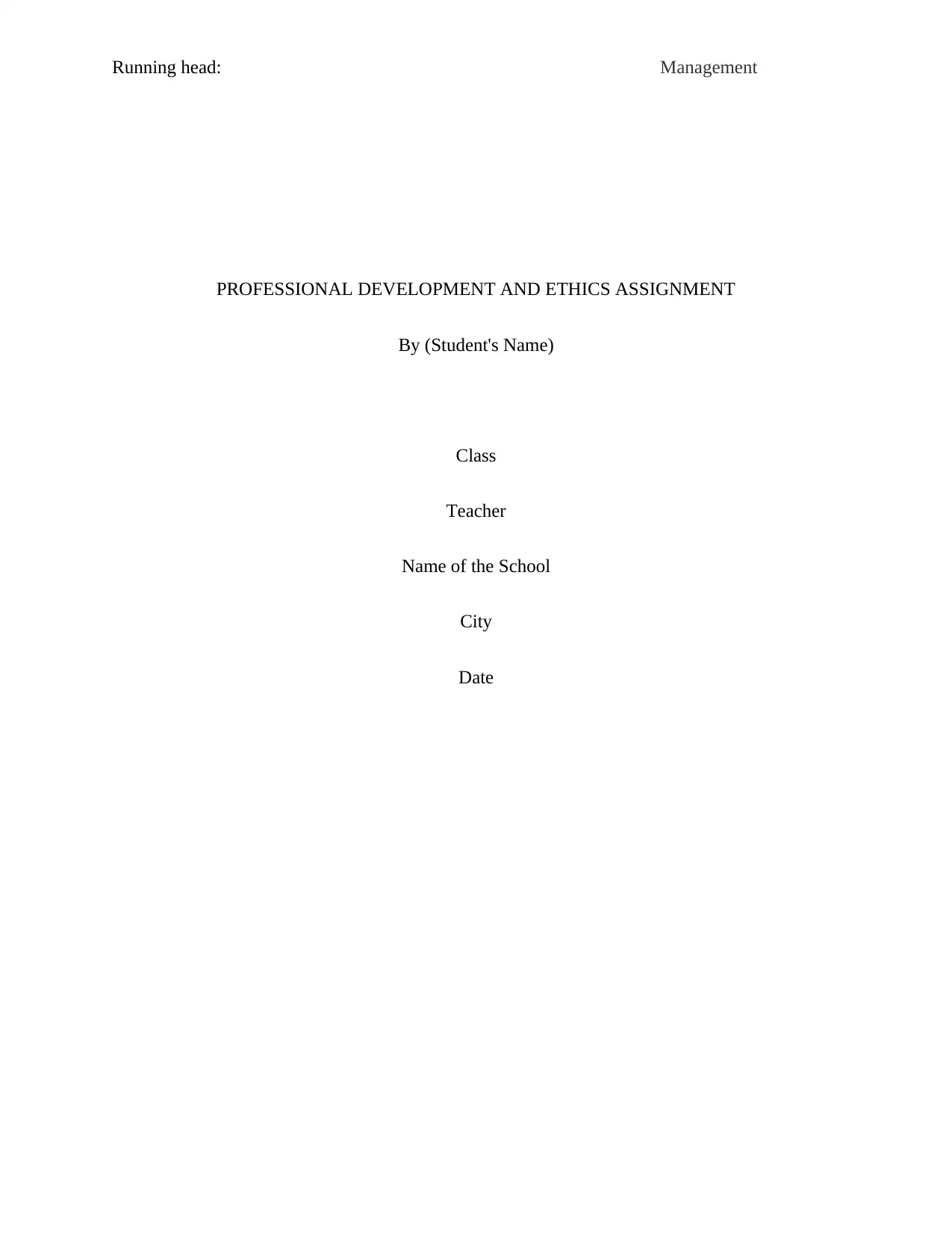
Running head: Management
PROFESSIONAL DEVELOPMENT AND ETHICS ASSIGNMENT
By (Student's Name)
Class
Teacher
Name of the School
City
Date
PROFESSIONAL DEVELOPMENT AND ETHICS ASSIGNMENT
By (Student's Name)
Class
Teacher
Name of the School
City
Date
Paraphrase This Document
Need a fresh take? Get an instant paraphrase of this document with our AI Paraphraser
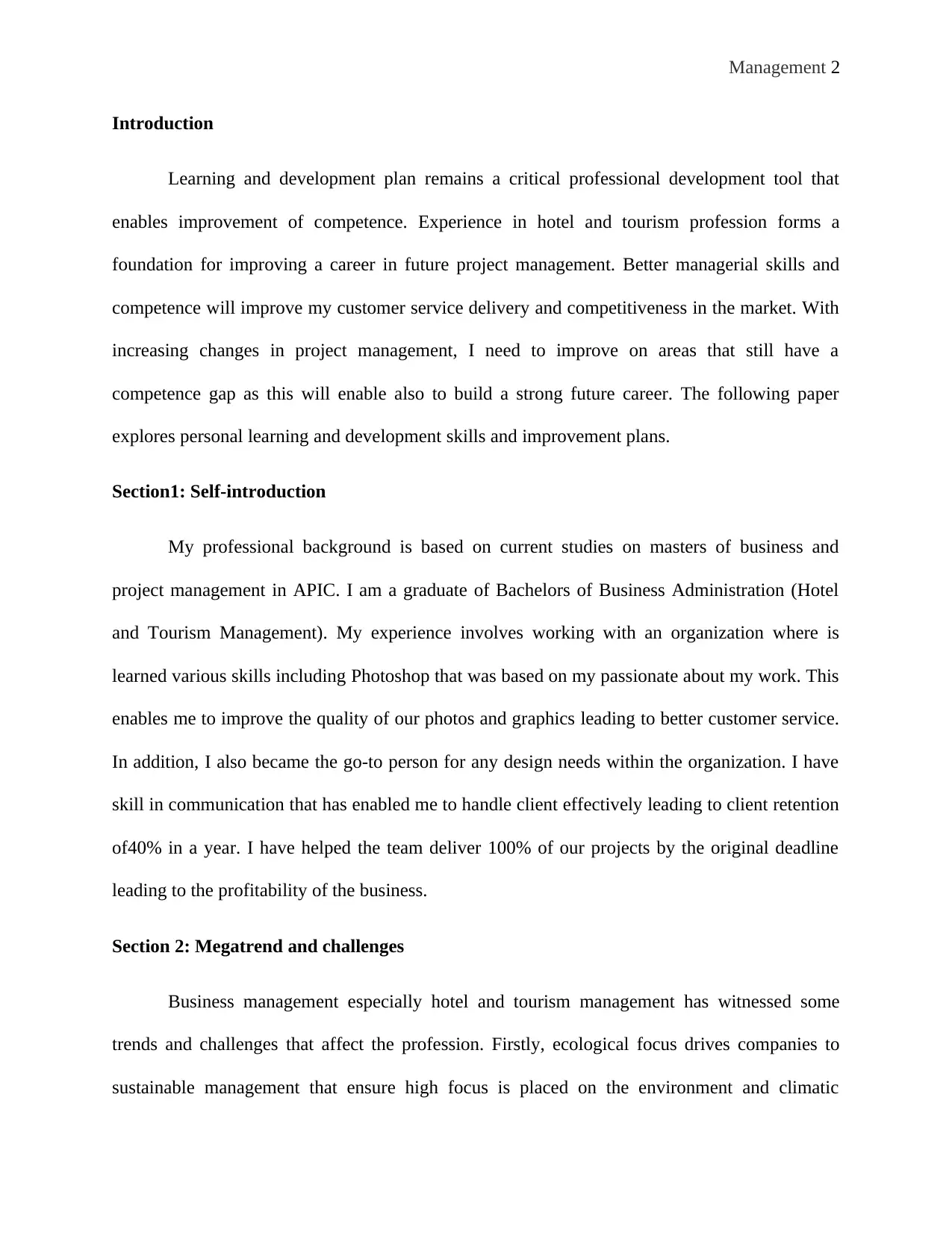
Management 2
Introduction
Learning and development plan remains a critical professional development tool that
enables improvement of competence. Experience in hotel and tourism profession forms a
foundation for improving a career in future project management. Better managerial skills and
competence will improve my customer service delivery and competitiveness in the market. With
increasing changes in project management, I need to improve on areas that still have a
competence gap as this will enable also to build a strong future career. The following paper
explores personal learning and development skills and improvement plans.
Section1: Self-introduction
My professional background is based on current studies on masters of business and
project management in APIC. I am a graduate of Bachelors of Business Administration (Hotel
and Tourism Management). My experience involves working with an organization where is
learned various skills including Photoshop that was based on my passionate about my work. This
enables me to improve the quality of our photos and graphics leading to better customer service.
In addition, I also became the go-to person for any design needs within the organization. I have
skill in communication that has enabled me to handle client effectively leading to client retention
of40% in a year. I have helped the team deliver 100% of our projects by the original deadline
leading to the profitability of the business.
Section 2: Megatrend and challenges
Business management especially hotel and tourism management has witnessed some
trends and challenges that affect the profession. Firstly, ecological focus drives companies to
sustainable management that ensure high focus is placed on the environment and climatic
Introduction
Learning and development plan remains a critical professional development tool that
enables improvement of competence. Experience in hotel and tourism profession forms a
foundation for improving a career in future project management. Better managerial skills and
competence will improve my customer service delivery and competitiveness in the market. With
increasing changes in project management, I need to improve on areas that still have a
competence gap as this will enable also to build a strong future career. The following paper
explores personal learning and development skills and improvement plans.
Section1: Self-introduction
My professional background is based on current studies on masters of business and
project management in APIC. I am a graduate of Bachelors of Business Administration (Hotel
and Tourism Management). My experience involves working with an organization where is
learned various skills including Photoshop that was based on my passionate about my work. This
enables me to improve the quality of our photos and graphics leading to better customer service.
In addition, I also became the go-to person for any design needs within the organization. I have
skill in communication that has enabled me to handle client effectively leading to client retention
of40% in a year. I have helped the team deliver 100% of our projects by the original deadline
leading to the profitability of the business.
Section 2: Megatrend and challenges
Business management especially hotel and tourism management has witnessed some
trends and challenges that affect the profession. Firstly, ecological focus drives companies to
sustainable management that ensure high focus is placed on the environment and climatic
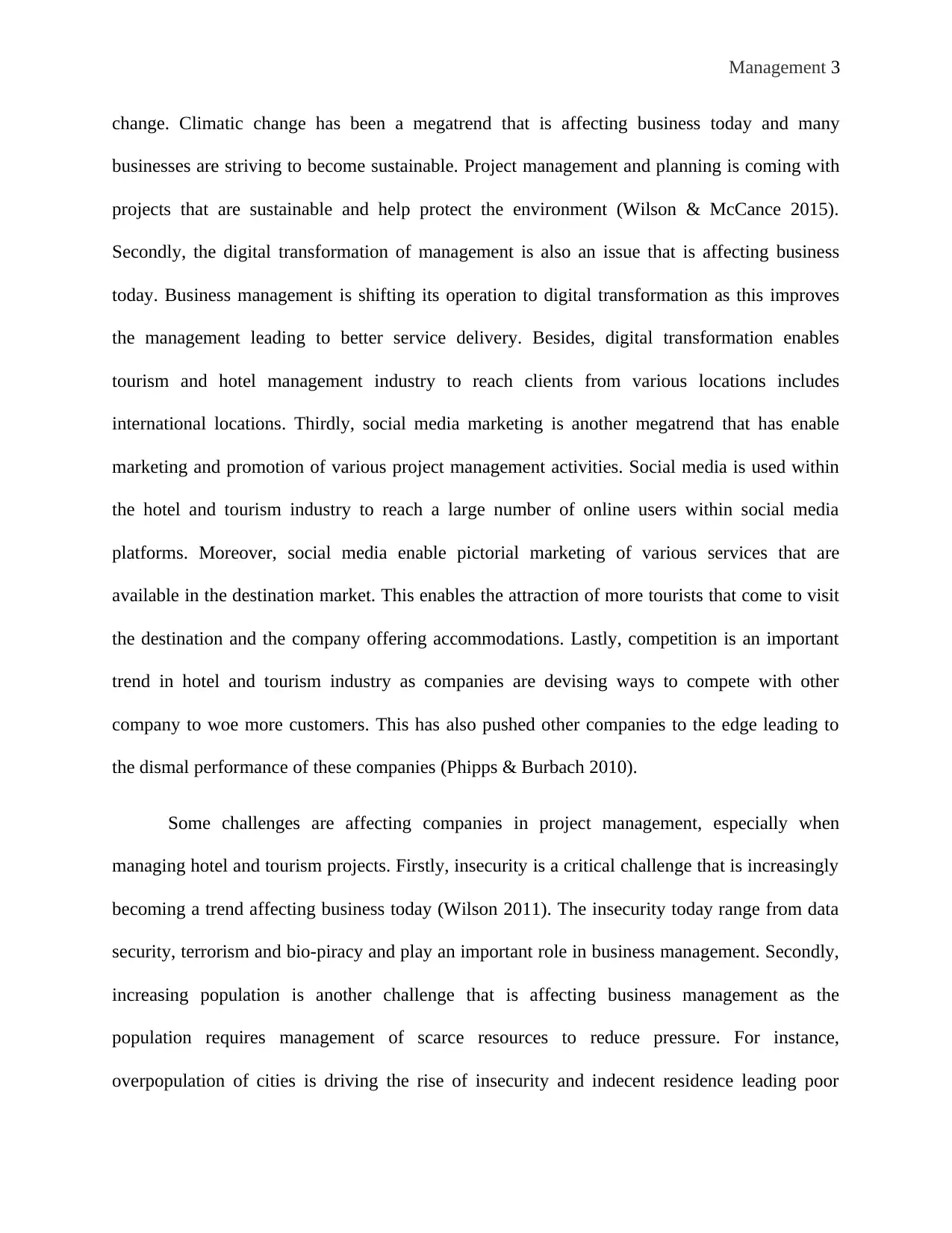
Management 3
change. Climatic change has been a megatrend that is affecting business today and many
businesses are striving to become sustainable. Project management and planning is coming with
projects that are sustainable and help protect the environment (Wilson & McCance 2015).
Secondly, the digital transformation of management is also an issue that is affecting business
today. Business management is shifting its operation to digital transformation as this improves
the management leading to better service delivery. Besides, digital transformation enables
tourism and hotel management industry to reach clients from various locations includes
international locations. Thirdly, social media marketing is another megatrend that has enable
marketing and promotion of various project management activities. Social media is used within
the hotel and tourism industry to reach a large number of online users within social media
platforms. Moreover, social media enable pictorial marketing of various services that are
available in the destination market. This enables the attraction of more tourists that come to visit
the destination and the company offering accommodations. Lastly, competition is an important
trend in hotel and tourism industry as companies are devising ways to compete with other
company to woe more customers. This has also pushed other companies to the edge leading to
the dismal performance of these companies (Phipps & Burbach 2010).
Some challenges are affecting companies in project management, especially when
managing hotel and tourism projects. Firstly, insecurity is a critical challenge that is increasingly
becoming a trend affecting business today (Wilson 2011). The insecurity today range from data
security, terrorism and bio-piracy and play an important role in business management. Secondly,
increasing population is another challenge that is affecting business management as the
population requires management of scarce resources to reduce pressure. For instance,
overpopulation of cities is driving the rise of insecurity and indecent residence leading poor
change. Climatic change has been a megatrend that is affecting business today and many
businesses are striving to become sustainable. Project management and planning is coming with
projects that are sustainable and help protect the environment (Wilson & McCance 2015).
Secondly, the digital transformation of management is also an issue that is affecting business
today. Business management is shifting its operation to digital transformation as this improves
the management leading to better service delivery. Besides, digital transformation enables
tourism and hotel management industry to reach clients from various locations includes
international locations. Thirdly, social media marketing is another megatrend that has enable
marketing and promotion of various project management activities. Social media is used within
the hotel and tourism industry to reach a large number of online users within social media
platforms. Moreover, social media enable pictorial marketing of various services that are
available in the destination market. This enables the attraction of more tourists that come to visit
the destination and the company offering accommodations. Lastly, competition is an important
trend in hotel and tourism industry as companies are devising ways to compete with other
company to woe more customers. This has also pushed other companies to the edge leading to
the dismal performance of these companies (Phipps & Burbach 2010).
Some challenges are affecting companies in project management, especially when
managing hotel and tourism projects. Firstly, insecurity is a critical challenge that is increasingly
becoming a trend affecting business today (Wilson 2011). The insecurity today range from data
security, terrorism and bio-piracy and play an important role in business management. Secondly,
increasing population is another challenge that is affecting business management as the
population requires management of scarce resources to reduce pressure. For instance,
overpopulation of cities is driving the rise of insecurity and indecent residence leading poor
⊘ This is a preview!⊘
Do you want full access?
Subscribe today to unlock all pages.

Trusted by 1+ million students worldwide
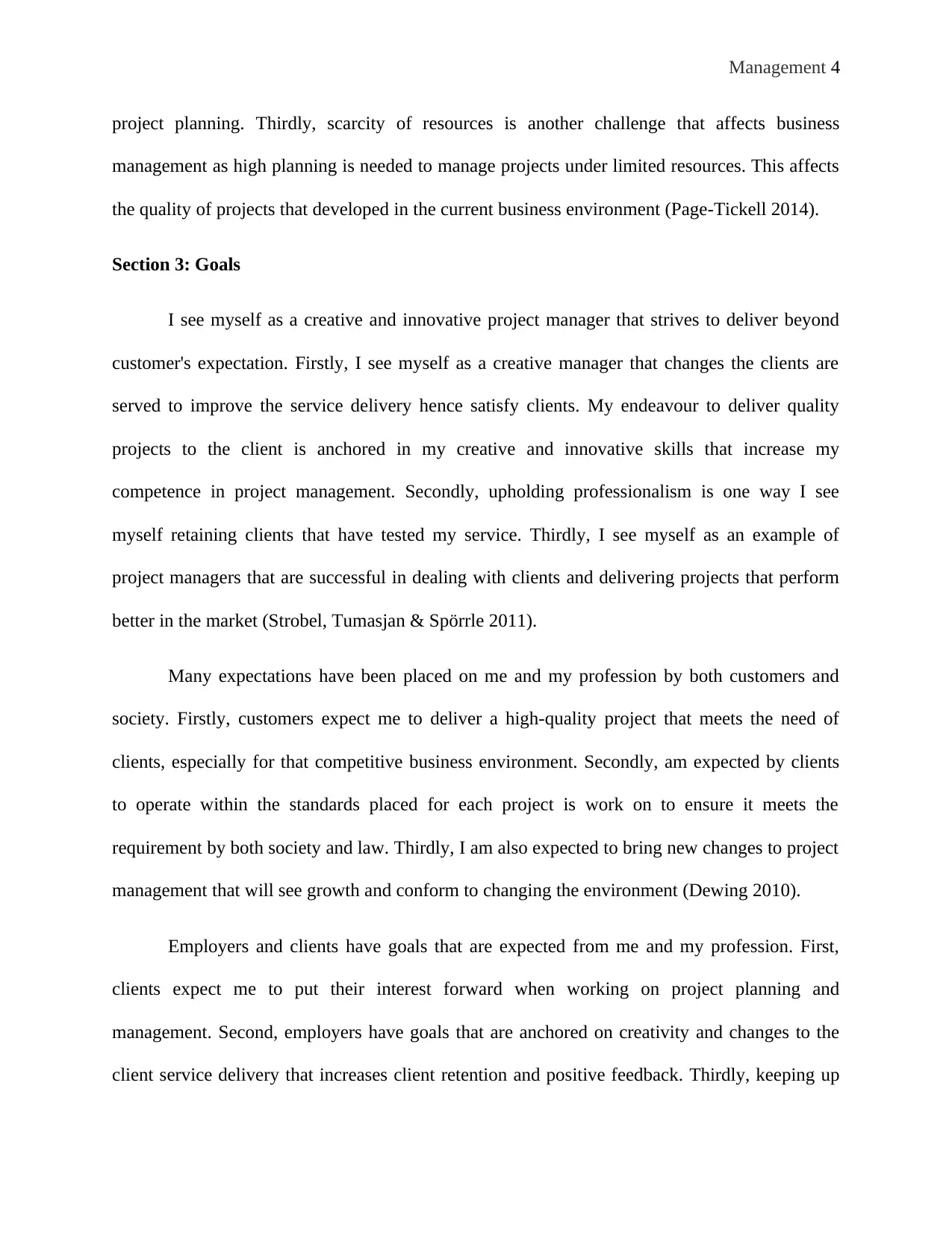
Management 4
project planning. Thirdly, scarcity of resources is another challenge that affects business
management as high planning is needed to manage projects under limited resources. This affects
the quality of projects that developed in the current business environment (Page-Tickell 2014).
Section 3: Goals
I see myself as a creative and innovative project manager that strives to deliver beyond
customer's expectation. Firstly, I see myself as a creative manager that changes the clients are
served to improve the service delivery hence satisfy clients. My endeavour to deliver quality
projects to the client is anchored in my creative and innovative skills that increase my
competence in project management. Secondly, upholding professionalism is one way I see
myself retaining clients that have tested my service. Thirdly, I see myself as an example of
project managers that are successful in dealing with clients and delivering projects that perform
better in the market (Strobel, Tumasjan & Spörrle 2011).
Many expectations have been placed on me and my profession by both customers and
society. Firstly, customers expect me to deliver a high-quality project that meets the need of
clients, especially for that competitive business environment. Secondly, am expected by clients
to operate within the standards placed for each project is work on to ensure it meets the
requirement by both society and law. Thirdly, I am also expected to bring new changes to project
management that will see growth and conform to changing the environment (Dewing 2010).
Employers and clients have goals that are expected from me and my profession. First,
clients expect me to put their interest forward when working on project planning and
management. Second, employers have goals that are anchored on creativity and changes to the
client service delivery that increases client retention and positive feedback. Thirdly, keeping up
project planning. Thirdly, scarcity of resources is another challenge that affects business
management as high planning is needed to manage projects under limited resources. This affects
the quality of projects that developed in the current business environment (Page-Tickell 2014).
Section 3: Goals
I see myself as a creative and innovative project manager that strives to deliver beyond
customer's expectation. Firstly, I see myself as a creative manager that changes the clients are
served to improve the service delivery hence satisfy clients. My endeavour to deliver quality
projects to the client is anchored in my creative and innovative skills that increase my
competence in project management. Secondly, upholding professionalism is one way I see
myself retaining clients that have tested my service. Thirdly, I see myself as an example of
project managers that are successful in dealing with clients and delivering projects that perform
better in the market (Strobel, Tumasjan & Spörrle 2011).
Many expectations have been placed on me and my profession by both customers and
society. Firstly, customers expect me to deliver a high-quality project that meets the need of
clients, especially for that competitive business environment. Secondly, am expected by clients
to operate within the standards placed for each project is work on to ensure it meets the
requirement by both society and law. Thirdly, I am also expected to bring new changes to project
management that will see growth and conform to changing the environment (Dewing 2010).
Employers and clients have goals that are expected from me and my profession. First,
clients expect me to put their interest forward when working on project planning and
management. Second, employers have goals that are anchored on creativity and changes to the
client service delivery that increases client retention and positive feedback. Thirdly, keeping up
Paraphrase This Document
Need a fresh take? Get an instant paraphrase of this document with our AI Paraphraser
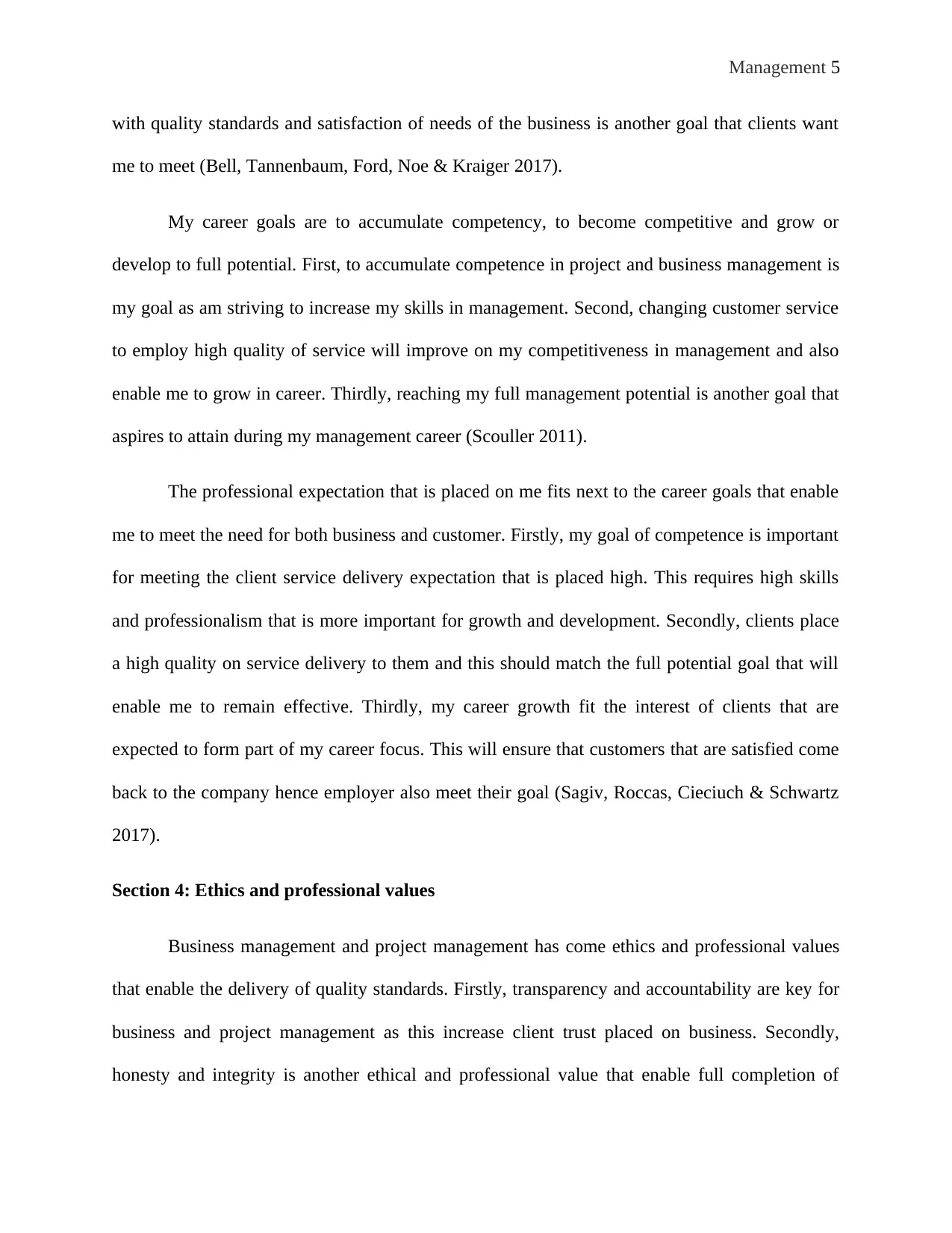
Management 5
with quality standards and satisfaction of needs of the business is another goal that clients want
me to meet (Bell, Tannenbaum, Ford, Noe & Kraiger 2017).
My career goals are to accumulate competency, to become competitive and grow or
develop to full potential. First, to accumulate competence in project and business management is
my goal as am striving to increase my skills in management. Second, changing customer service
to employ high quality of service will improve on my competitiveness in management and also
enable me to grow in career. Thirdly, reaching my full management potential is another goal that
aspires to attain during my management career (Scouller 2011).
The professional expectation that is placed on me fits next to the career goals that enable
me to meet the need for both business and customer. Firstly, my goal of competence is important
for meeting the client service delivery expectation that is placed high. This requires high skills
and professionalism that is more important for growth and development. Secondly, clients place
a high quality on service delivery to them and this should match the full potential goal that will
enable me to remain effective. Thirdly, my career growth fit the interest of clients that are
expected to form part of my career focus. This will ensure that customers that are satisfied come
back to the company hence employer also meet their goal (Sagiv, Roccas, Cieciuch & Schwartz
2017).
Section 4: Ethics and professional values
Business management and project management has come ethics and professional values
that enable the delivery of quality standards. Firstly, transparency and accountability are key for
business and project management as this increase client trust placed on business. Secondly,
honesty and integrity is another ethical and professional value that enable full completion of
with quality standards and satisfaction of needs of the business is another goal that clients want
me to meet (Bell, Tannenbaum, Ford, Noe & Kraiger 2017).
My career goals are to accumulate competency, to become competitive and grow or
develop to full potential. First, to accumulate competence in project and business management is
my goal as am striving to increase my skills in management. Second, changing customer service
to employ high quality of service will improve on my competitiveness in management and also
enable me to grow in career. Thirdly, reaching my full management potential is another goal that
aspires to attain during my management career (Scouller 2011).
The professional expectation that is placed on me fits next to the career goals that enable
me to meet the need for both business and customer. Firstly, my goal of competence is important
for meeting the client service delivery expectation that is placed high. This requires high skills
and professionalism that is more important for growth and development. Secondly, clients place
a high quality on service delivery to them and this should match the full potential goal that will
enable me to remain effective. Thirdly, my career growth fit the interest of clients that are
expected to form part of my career focus. This will ensure that customers that are satisfied come
back to the company hence employer also meet their goal (Sagiv, Roccas, Cieciuch & Schwartz
2017).
Section 4: Ethics and professional values
Business management and project management has come ethics and professional values
that enable the delivery of quality standards. Firstly, transparency and accountability are key for
business and project management as this increase client trust placed on business. Secondly,
honesty and integrity is another ethical and professional value that enable full completion of
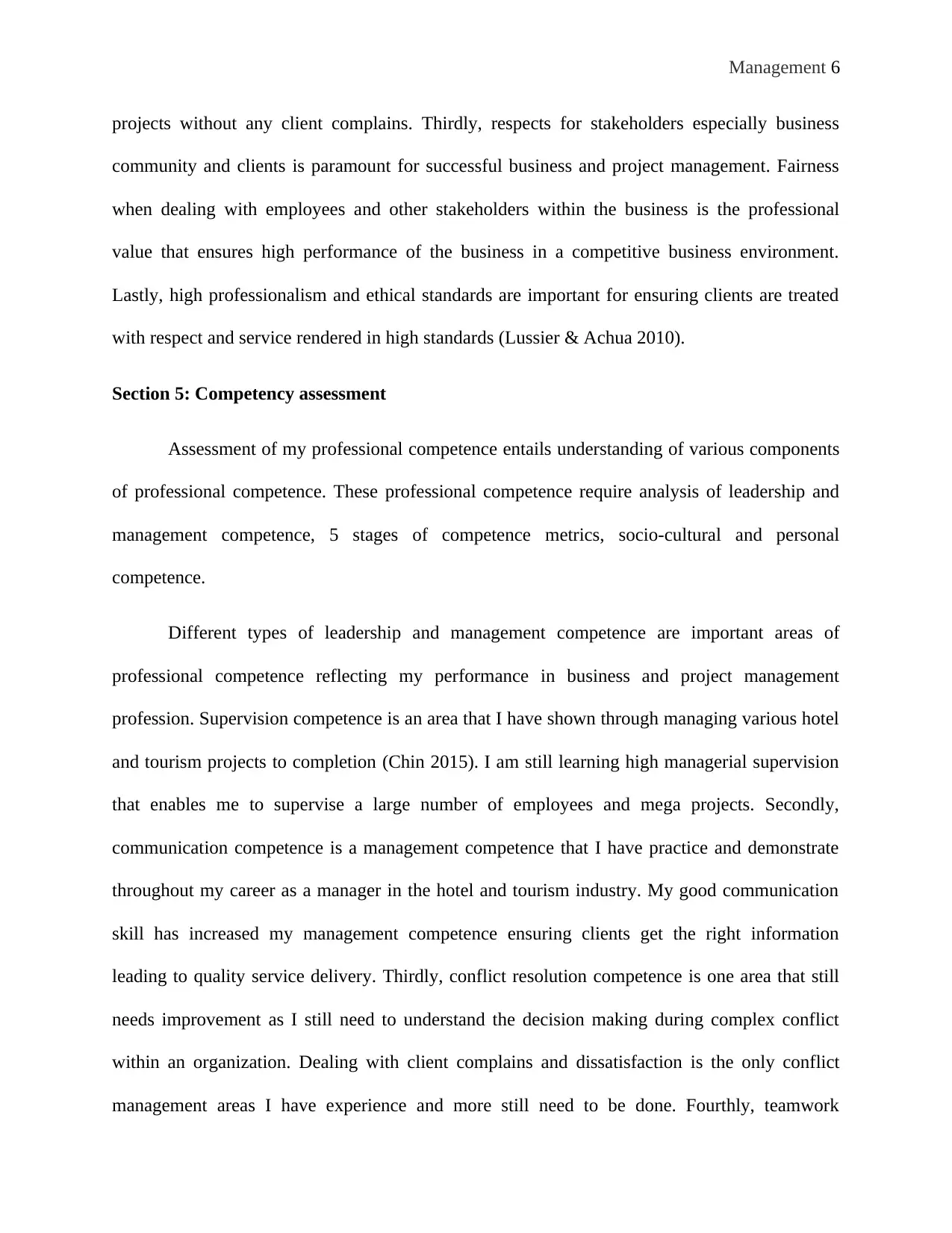
Management 6
projects without any client complains. Thirdly, respects for stakeholders especially business
community and clients is paramount for successful business and project management. Fairness
when dealing with employees and other stakeholders within the business is the professional
value that ensures high performance of the business in a competitive business environment.
Lastly, high professionalism and ethical standards are important for ensuring clients are treated
with respect and service rendered in high standards (Lussier & Achua 2010).
Section 5: Competency assessment
Assessment of my professional competence entails understanding of various components
of professional competence. These professional competence require analysis of leadership and
management competence, 5 stages of competence metrics, socio-cultural and personal
competence.
Different types of leadership and management competence are important areas of
professional competence reflecting my performance in business and project management
profession. Supervision competence is an area that I have shown through managing various hotel
and tourism projects to completion (Chin 2015). I am still learning high managerial supervision
that enables me to supervise a large number of employees and mega projects. Secondly,
communication competence is a management competence that I have practice and demonstrate
throughout my career as a manager in the hotel and tourism industry. My good communication
skill has increased my management competence ensuring clients get the right information
leading to quality service delivery. Thirdly, conflict resolution competence is one area that still
needs improvement as I still need to understand the decision making during complex conflict
within an organization. Dealing with client complains and dissatisfaction is the only conflict
management areas I have experience and more still need to be done. Fourthly, teamwork
projects without any client complains. Thirdly, respects for stakeholders especially business
community and clients is paramount for successful business and project management. Fairness
when dealing with employees and other stakeholders within the business is the professional
value that ensures high performance of the business in a competitive business environment.
Lastly, high professionalism and ethical standards are important for ensuring clients are treated
with respect and service rendered in high standards (Lussier & Achua 2010).
Section 5: Competency assessment
Assessment of my professional competence entails understanding of various components
of professional competence. These professional competence require analysis of leadership and
management competence, 5 stages of competence metrics, socio-cultural and personal
competence.
Different types of leadership and management competence are important areas of
professional competence reflecting my performance in business and project management
profession. Supervision competence is an area that I have shown through managing various hotel
and tourism projects to completion (Chin 2015). I am still learning high managerial supervision
that enables me to supervise a large number of employees and mega projects. Secondly,
communication competence is a management competence that I have practice and demonstrate
throughout my career as a manager in the hotel and tourism industry. My good communication
skill has increased my management competence ensuring clients get the right information
leading to quality service delivery. Thirdly, conflict resolution competence is one area that still
needs improvement as I still need to understand the decision making during complex conflict
within an organization. Dealing with client complains and dissatisfaction is the only conflict
management areas I have experience and more still need to be done. Fourthly, teamwork
⊘ This is a preview!⊘
Do you want full access?
Subscribe today to unlock all pages.

Trusted by 1+ million students worldwide
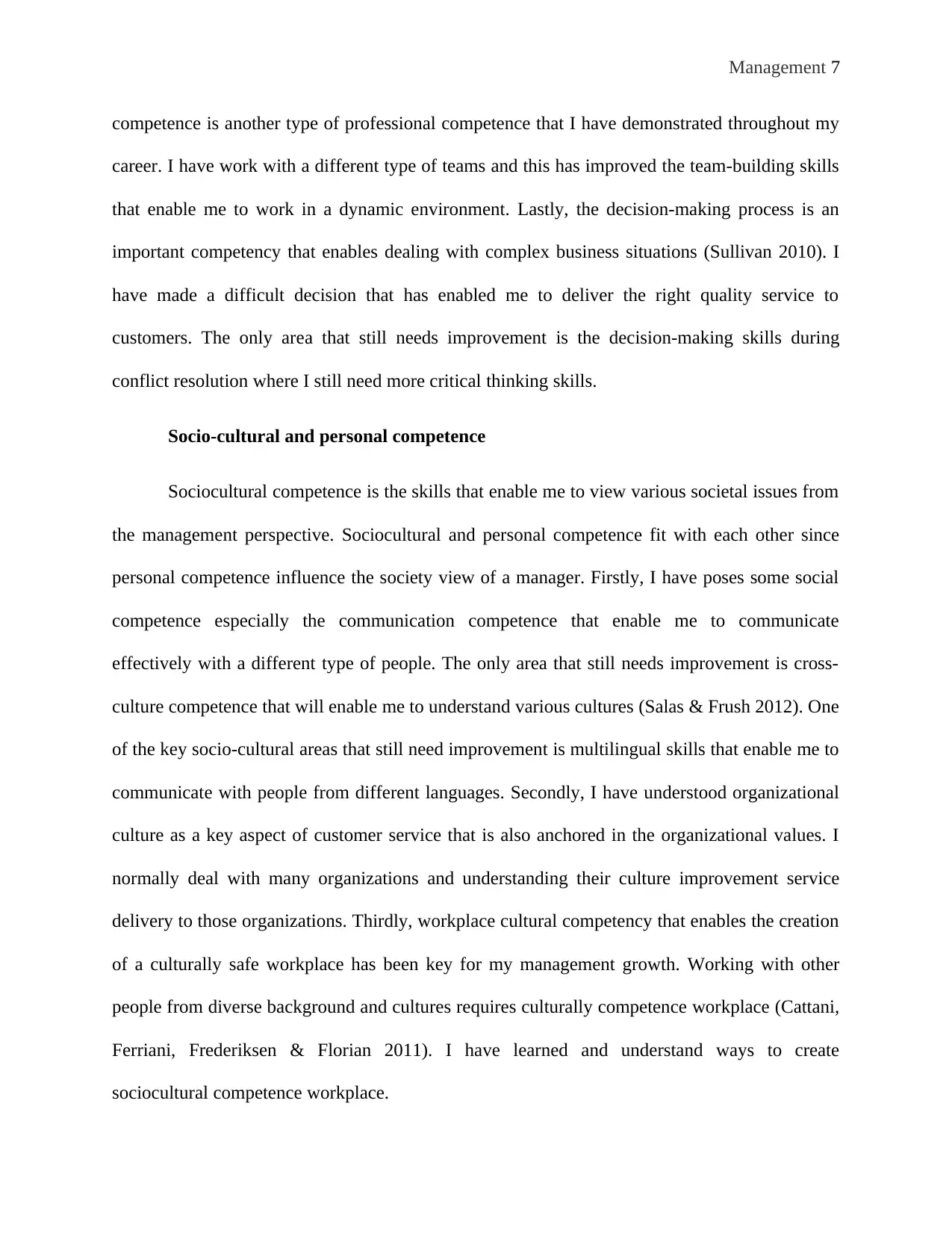
Management 7
competence is another type of professional competence that I have demonstrated throughout my
career. I have work with a different type of teams and this has improved the team-building skills
that enable me to work in a dynamic environment. Lastly, the decision-making process is an
important competency that enables dealing with complex business situations (Sullivan 2010). I
have made a difficult decision that has enabled me to deliver the right quality service to
customers. The only area that still needs improvement is the decision-making skills during
conflict resolution where I still need more critical thinking skills.
Socio-cultural and personal competence
Sociocultural competence is the skills that enable me to view various societal issues from
the management perspective. Sociocultural and personal competence fit with each other since
personal competence influence the society view of a manager. Firstly, I have poses some social
competence especially the communication competence that enable me to communicate
effectively with a different type of people. The only area that still needs improvement is cross-
culture competence that will enable me to understand various cultures (Salas & Frush 2012). One
of the key socio-cultural areas that still need improvement is multilingual skills that enable me to
communicate with people from different languages. Secondly, I have understood organizational
culture as a key aspect of customer service that is also anchored in the organizational values. I
normally deal with many organizations and understanding their culture improvement service
delivery to those organizations. Thirdly, workplace cultural competency that enables the creation
of a culturally safe workplace has been key for my management growth. Working with other
people from diverse background and cultures requires culturally competence workplace (Cattani,
Ferriani, Frederiksen & Florian 2011). I have learned and understand ways to create
sociocultural competence workplace.
competence is another type of professional competence that I have demonstrated throughout my
career. I have work with a different type of teams and this has improved the team-building skills
that enable me to work in a dynamic environment. Lastly, the decision-making process is an
important competency that enables dealing with complex business situations (Sullivan 2010). I
have made a difficult decision that has enabled me to deliver the right quality service to
customers. The only area that still needs improvement is the decision-making skills during
conflict resolution where I still need more critical thinking skills.
Socio-cultural and personal competence
Sociocultural competence is the skills that enable me to view various societal issues from
the management perspective. Sociocultural and personal competence fit with each other since
personal competence influence the society view of a manager. Firstly, I have poses some social
competence especially the communication competence that enable me to communicate
effectively with a different type of people. The only area that still needs improvement is cross-
culture competence that will enable me to understand various cultures (Salas & Frush 2012). One
of the key socio-cultural areas that still need improvement is multilingual skills that enable me to
communicate with people from different languages. Secondly, I have understood organizational
culture as a key aspect of customer service that is also anchored in the organizational values. I
normally deal with many organizations and understanding their culture improvement service
delivery to those organizations. Thirdly, workplace cultural competency that enables the creation
of a culturally safe workplace has been key for my management growth. Working with other
people from diverse background and cultures requires culturally competence workplace (Cattani,
Ferriani, Frederiksen & Florian 2011). I have learned and understand ways to create
sociocultural competence workplace.
Paraphrase This Document
Need a fresh take? Get an instant paraphrase of this document with our AI Paraphraser
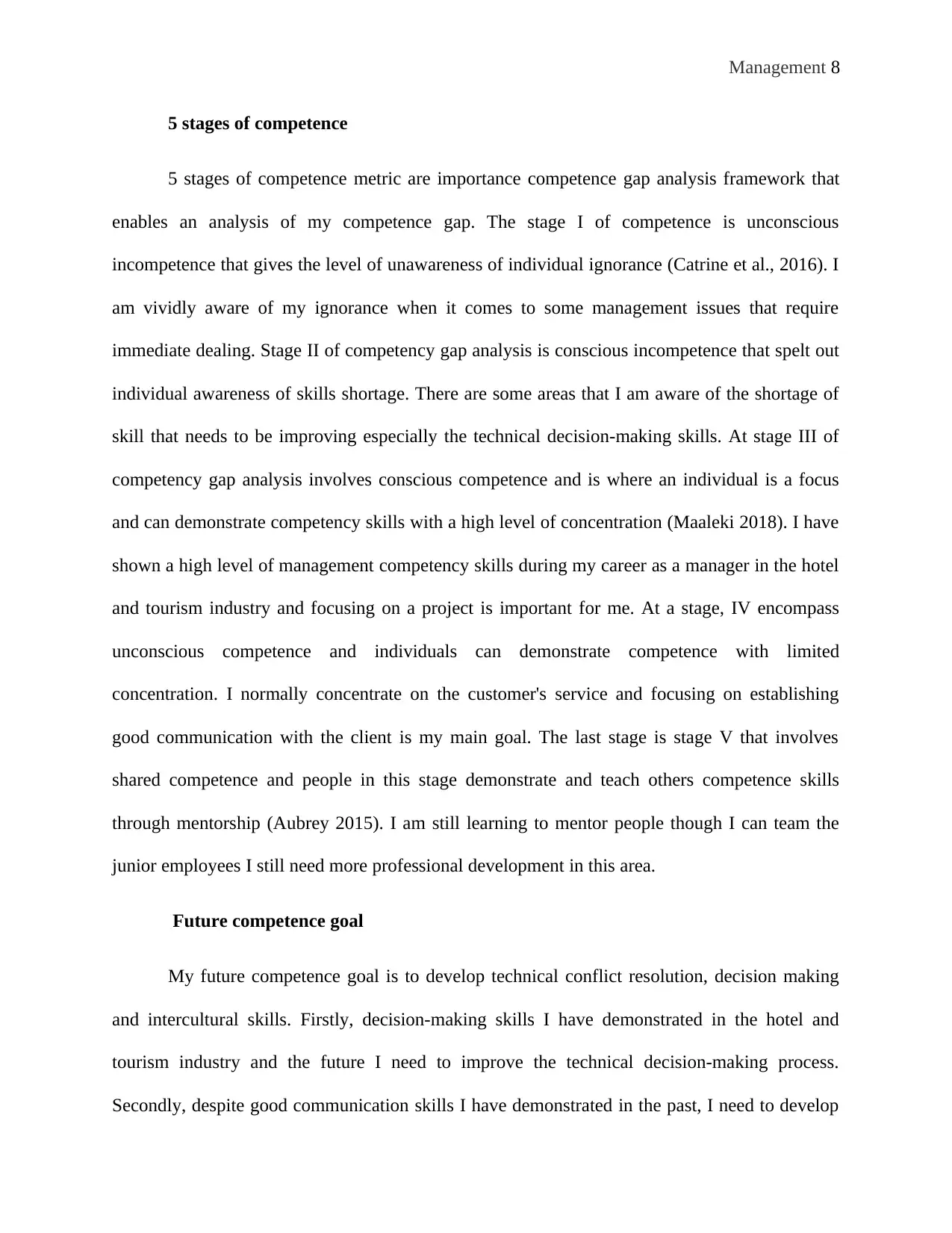
Management 8
5 stages of competence
5 stages of competence metric are importance competence gap analysis framework that
enables an analysis of my competence gap. The stage I of competence is unconscious
incompetence that gives the level of unawareness of individual ignorance (Catrine et al., 2016). I
am vividly aware of my ignorance when it comes to some management issues that require
immediate dealing. Stage II of competency gap analysis is conscious incompetence that spelt out
individual awareness of skills shortage. There are some areas that I am aware of the shortage of
skill that needs to be improving especially the technical decision-making skills. At stage III of
competency gap analysis involves conscious competence and is where an individual is a focus
and can demonstrate competency skills with a high level of concentration (Maaleki 2018). I have
shown a high level of management competency skills during my career as a manager in the hotel
and tourism industry and focusing on a project is important for me. At a stage, IV encompass
unconscious competence and individuals can demonstrate competence with limited
concentration. I normally concentrate on the customer's service and focusing on establishing
good communication with the client is my main goal. The last stage is stage V that involves
shared competence and people in this stage demonstrate and teach others competence skills
through mentorship (Aubrey 2015). I am still learning to mentor people though I can team the
junior employees I still need more professional development in this area.
Future competence goal
My future competence goal is to develop technical conflict resolution, decision making
and intercultural skills. Firstly, decision-making skills I have demonstrated in the hotel and
tourism industry and the future I need to improve the technical decision-making process.
Secondly, despite good communication skills I have demonstrated in the past, I need to develop
5 stages of competence
5 stages of competence metric are importance competence gap analysis framework that
enables an analysis of my competence gap. The stage I of competence is unconscious
incompetence that gives the level of unawareness of individual ignorance (Catrine et al., 2016). I
am vividly aware of my ignorance when it comes to some management issues that require
immediate dealing. Stage II of competency gap analysis is conscious incompetence that spelt out
individual awareness of skills shortage. There are some areas that I am aware of the shortage of
skill that needs to be improving especially the technical decision-making skills. At stage III of
competency gap analysis involves conscious competence and is where an individual is a focus
and can demonstrate competency skills with a high level of concentration (Maaleki 2018). I have
shown a high level of management competency skills during my career as a manager in the hotel
and tourism industry and focusing on a project is important for me. At a stage, IV encompass
unconscious competence and individuals can demonstrate competence with limited
concentration. I normally concentrate on the customer's service and focusing on establishing
good communication with the client is my main goal. The last stage is stage V that involves
shared competence and people in this stage demonstrate and teach others competence skills
through mentorship (Aubrey 2015). I am still learning to mentor people though I can team the
junior employees I still need more professional development in this area.
Future competence goal
My future competence goal is to develop technical conflict resolution, decision making
and intercultural skills. Firstly, decision-making skills I have demonstrated in the hotel and
tourism industry and the future I need to improve the technical decision-making process.
Secondly, despite good communication skills I have demonstrated in the past, I need to develop
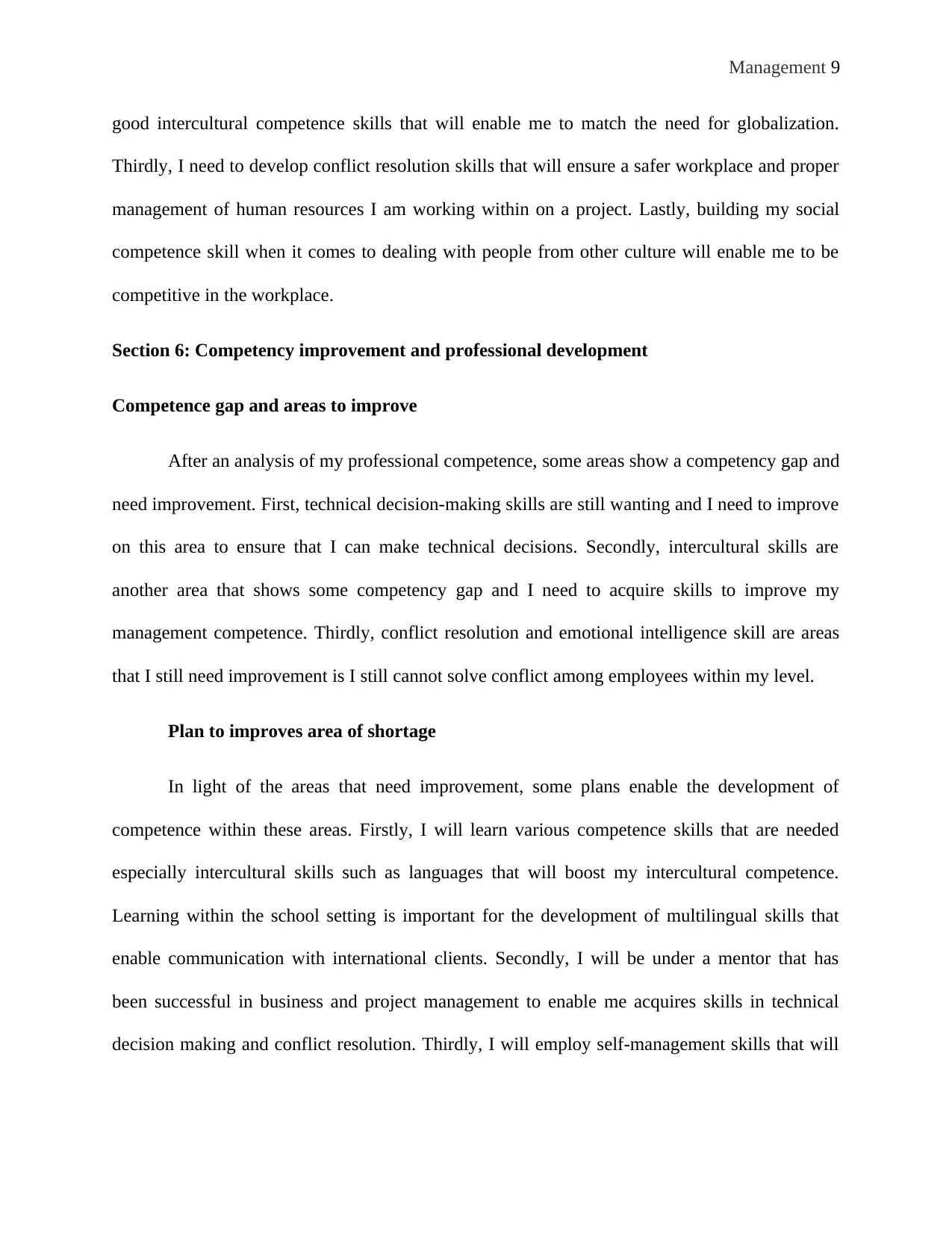
Management 9
good intercultural competence skills that will enable me to match the need for globalization.
Thirdly, I need to develop conflict resolution skills that will ensure a safer workplace and proper
management of human resources I am working within on a project. Lastly, building my social
competence skill when it comes to dealing with people from other culture will enable me to be
competitive in the workplace.
Section 6: Competency improvement and professional development
Competence gap and areas to improve
After an analysis of my professional competence, some areas show a competency gap and
need improvement. First, technical decision-making skills are still wanting and I need to improve
on this area to ensure that I can make technical decisions. Secondly, intercultural skills are
another area that shows some competency gap and I need to acquire skills to improve my
management competence. Thirdly, conflict resolution and emotional intelligence skill are areas
that I still need improvement is I still cannot solve conflict among employees within my level.
Plan to improves area of shortage
In light of the areas that need improvement, some plans enable the development of
competence within these areas. Firstly, I will learn various competence skills that are needed
especially intercultural skills such as languages that will boost my intercultural competence.
Learning within the school setting is important for the development of multilingual skills that
enable communication with international clients. Secondly, I will be under a mentor that has
been successful in business and project management to enable me acquires skills in technical
decision making and conflict resolution. Thirdly, I will employ self-management skills that will
good intercultural competence skills that will enable me to match the need for globalization.
Thirdly, I need to develop conflict resolution skills that will ensure a safer workplace and proper
management of human resources I am working within on a project. Lastly, building my social
competence skill when it comes to dealing with people from other culture will enable me to be
competitive in the workplace.
Section 6: Competency improvement and professional development
Competence gap and areas to improve
After an analysis of my professional competence, some areas show a competency gap and
need improvement. First, technical decision-making skills are still wanting and I need to improve
on this area to ensure that I can make technical decisions. Secondly, intercultural skills are
another area that shows some competency gap and I need to acquire skills to improve my
management competence. Thirdly, conflict resolution and emotional intelligence skill are areas
that I still need improvement is I still cannot solve conflict among employees within my level.
Plan to improves area of shortage
In light of the areas that need improvement, some plans enable the development of
competence within these areas. Firstly, I will learn various competence skills that are needed
especially intercultural skills such as languages that will boost my intercultural competence.
Learning within the school setting is important for the development of multilingual skills that
enable communication with international clients. Secondly, I will be under a mentor that has
been successful in business and project management to enable me acquires skills in technical
decision making and conflict resolution. Thirdly, I will employ self-management skills that will
⊘ This is a preview!⊘
Do you want full access?
Subscribe today to unlock all pages.

Trusted by 1+ million students worldwide
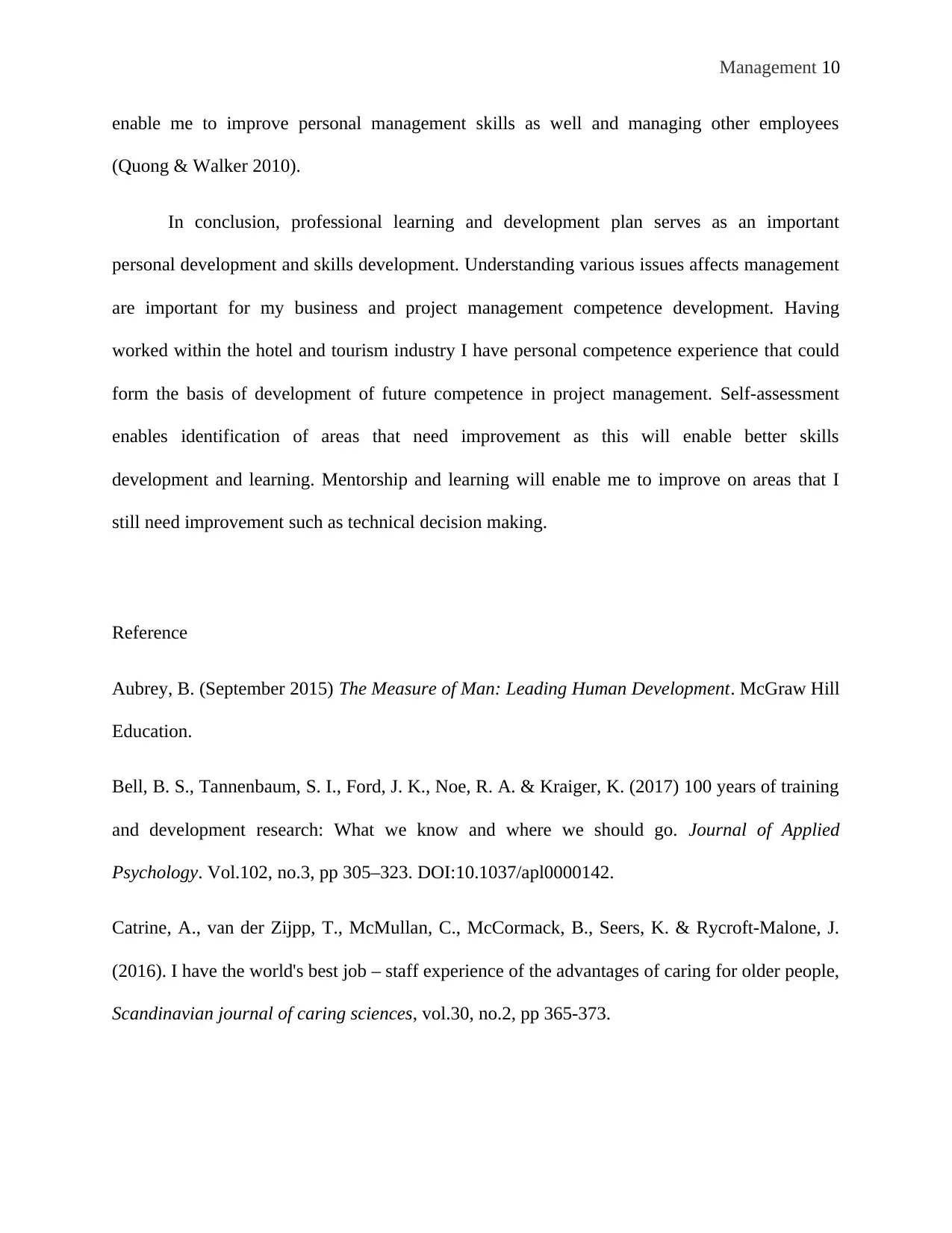
Management 10
enable me to improve personal management skills as well and managing other employees
(Quong & Walker 2010).
In conclusion, professional learning and development plan serves as an important
personal development and skills development. Understanding various issues affects management
are important for my business and project management competence development. Having
worked within the hotel and tourism industry I have personal competence experience that could
form the basis of development of future competence in project management. Self-assessment
enables identification of areas that need improvement as this will enable better skills
development and learning. Mentorship and learning will enable me to improve on areas that I
still need improvement such as technical decision making.
Reference
Aubrey, B. (September 2015) The Measure of Man: Leading Human Development. McGraw Hill
Education.
Bell, B. S., Tannenbaum, S. I., Ford, J. K., Noe, R. A. & Kraiger, K. (2017) 100 years of training
and development research: What we know and where we should go. Journal of Applied
Psychology. Vol.102, no.3, pp 305–323. DOI:10.1037/apl0000142.
Catrine, A., van der Zijpp, T., McMullan, C., McCormack, B., Seers, K. & Rycroft-Malone, J.
(2016). I have the world's best job – staff experience of the advantages of caring for older people,
Scandinavian journal of caring sciences, vol.30, no.2, pp 365-373.
enable me to improve personal management skills as well and managing other employees
(Quong & Walker 2010).
In conclusion, professional learning and development plan serves as an important
personal development and skills development. Understanding various issues affects management
are important for my business and project management competence development. Having
worked within the hotel and tourism industry I have personal competence experience that could
form the basis of development of future competence in project management. Self-assessment
enables identification of areas that need improvement as this will enable better skills
development and learning. Mentorship and learning will enable me to improve on areas that I
still need improvement such as technical decision making.
Reference
Aubrey, B. (September 2015) The Measure of Man: Leading Human Development. McGraw Hill
Education.
Bell, B. S., Tannenbaum, S. I., Ford, J. K., Noe, R. A. & Kraiger, K. (2017) 100 years of training
and development research: What we know and where we should go. Journal of Applied
Psychology. Vol.102, no.3, pp 305–323. DOI:10.1037/apl0000142.
Catrine, A., van der Zijpp, T., McMullan, C., McCormack, B., Seers, K. & Rycroft-Malone, J.
(2016). I have the world's best job – staff experience of the advantages of caring for older people,
Scandinavian journal of caring sciences, vol.30, no.2, pp 365-373.
Paraphrase This Document
Need a fresh take? Get an instant paraphrase of this document with our AI Paraphraser
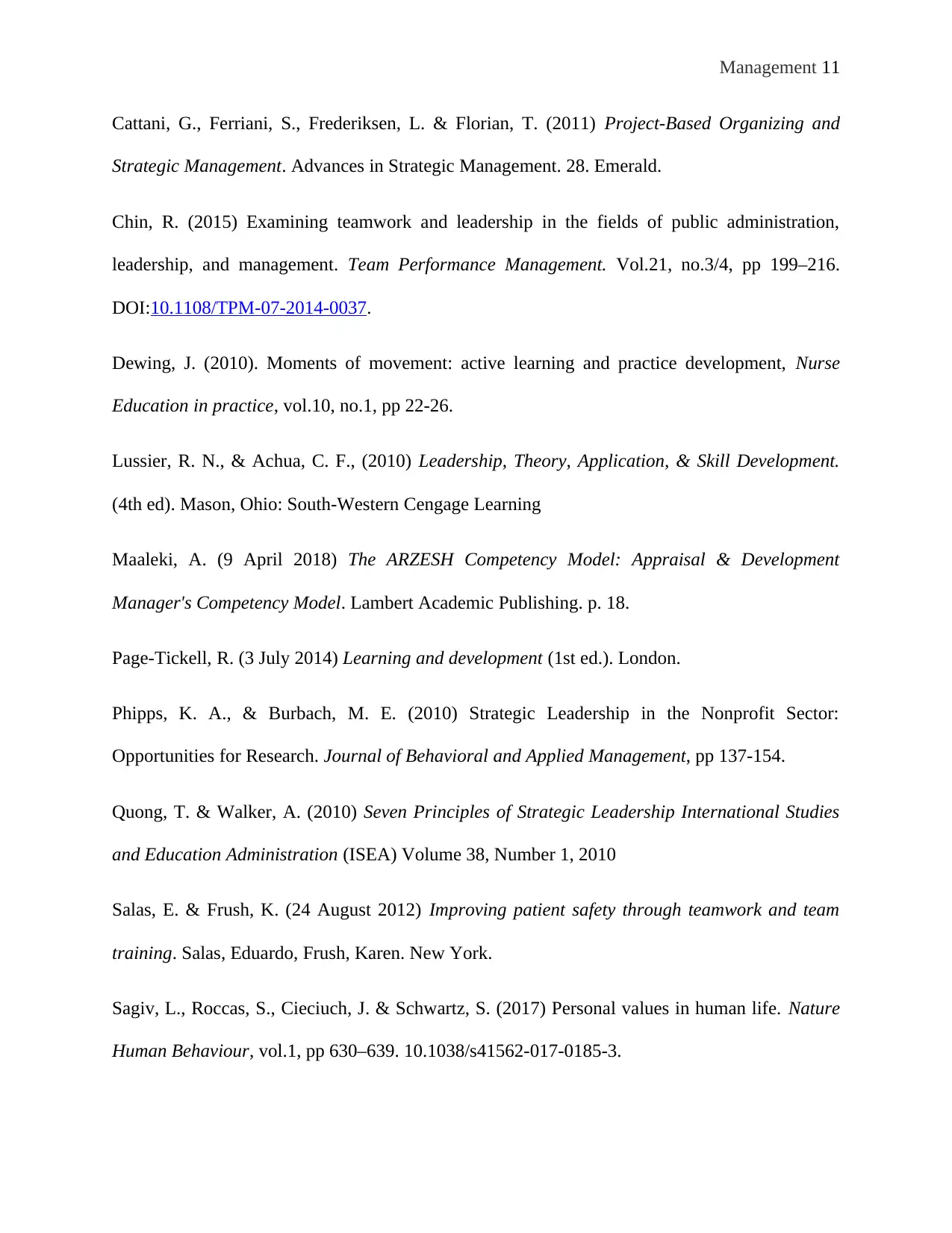
Management 11
Cattani, G., Ferriani, S., Frederiksen, L. & Florian, T. (2011) Project-Based Organizing and
Strategic Management. Advances in Strategic Management. 28. Emerald.
Chin, R. (2015) Examining teamwork and leadership in the fields of public administration,
leadership, and management. Team Performance Management. Vol.21, no.3/4, pp 199–216.
DOI:10.1108/TPM-07-2014-0037.
Dewing, J. (2010). Moments of movement: active learning and practice development, Nurse
Education in practice, vol.10, no.1, pp 22-26.
Lussier, R. N., & Achua, C. F., (2010) Leadership, Theory, Application, & Skill Development.
(4th ed). Mason, Ohio: South-Western Cengage Learning
Maaleki, A. (9 April 2018) The ARZESH Competency Model: Appraisal & Development
Manager's Competency Model. Lambert Academic Publishing. p. 18.
Page-Tickell, R. (3 July 2014) Learning and development (1st ed.). London.
Phipps, K. A., & Burbach, M. E. (2010) Strategic Leadership in the Nonprofit Sector:
Opportunities for Research. Journal of Behavioral and Applied Management, pp 137-154.
Quong, T. & Walker, A. (2010) Seven Principles of Strategic Leadership International Studies
and Education Administration (ISEA) Volume 38, Number 1, 2010
Salas, E. & Frush, K. (24 August 2012) Improving patient safety through teamwork and team
training. Salas, Eduardo, Frush, Karen. New York.
Sagiv, L., Roccas, S., Cieciuch, J. & Schwartz, S. (2017) Personal values in human life. Nature
Human Behaviour, vol.1, pp 630–639. 10.1038/s41562-017-0185-3.
Cattani, G., Ferriani, S., Frederiksen, L. & Florian, T. (2011) Project-Based Organizing and
Strategic Management. Advances in Strategic Management. 28. Emerald.
Chin, R. (2015) Examining teamwork and leadership in the fields of public administration,
leadership, and management. Team Performance Management. Vol.21, no.3/4, pp 199–216.
DOI:10.1108/TPM-07-2014-0037.
Dewing, J. (2010). Moments of movement: active learning and practice development, Nurse
Education in practice, vol.10, no.1, pp 22-26.
Lussier, R. N., & Achua, C. F., (2010) Leadership, Theory, Application, & Skill Development.
(4th ed). Mason, Ohio: South-Western Cengage Learning
Maaleki, A. (9 April 2018) The ARZESH Competency Model: Appraisal & Development
Manager's Competency Model. Lambert Academic Publishing. p. 18.
Page-Tickell, R. (3 July 2014) Learning and development (1st ed.). London.
Phipps, K. A., & Burbach, M. E. (2010) Strategic Leadership in the Nonprofit Sector:
Opportunities for Research. Journal of Behavioral and Applied Management, pp 137-154.
Quong, T. & Walker, A. (2010) Seven Principles of Strategic Leadership International Studies
and Education Administration (ISEA) Volume 38, Number 1, 2010
Salas, E. & Frush, K. (24 August 2012) Improving patient safety through teamwork and team
training. Salas, Eduardo, Frush, Karen. New York.
Sagiv, L., Roccas, S., Cieciuch, J. & Schwartz, S. (2017) Personal values in human life. Nature
Human Behaviour, vol.1, pp 630–639. 10.1038/s41562-017-0185-3.
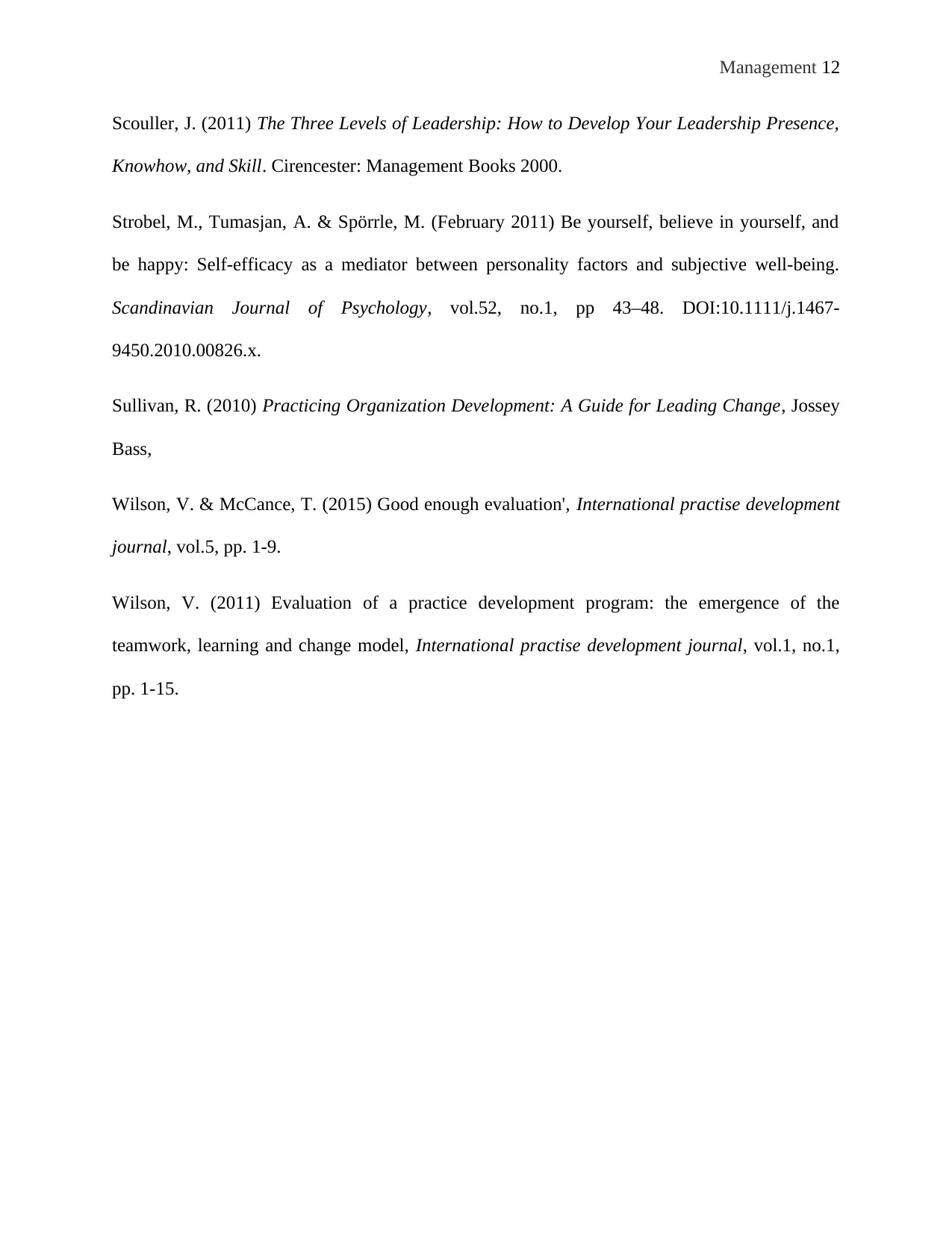
Management 12
Scouller, J. (2011) The Three Levels of Leadership: How to Develop Your Leadership Presence,
Knowhow, and Skill. Cirencester: Management Books 2000.
Strobel, M., Tumasjan, A. & Spörrle, M. (February 2011) Be yourself, believe in yourself, and
be happy: Self-efficacy as a mediator between personality factors and subjective well-being.
Scandinavian Journal of Psychology, vol.52, no.1, pp 43–48. DOI:10.1111/j.1467-
9450.2010.00826.x.
Sullivan, R. (2010) Practicing Organization Development: A Guide for Leading Change, Jossey
Bass,
Wilson, V. & McCance, T. (2015) Good enough evaluation', International practise development
journal, vol.5, pp. 1-9.
Wilson, V. (2011) Evaluation of a practice development program: the emergence of the
teamwork, learning and change model, International practise development journal, vol.1, no.1,
pp. 1-15.
Scouller, J. (2011) The Three Levels of Leadership: How to Develop Your Leadership Presence,
Knowhow, and Skill. Cirencester: Management Books 2000.
Strobel, M., Tumasjan, A. & Spörrle, M. (February 2011) Be yourself, believe in yourself, and
be happy: Self-efficacy as a mediator between personality factors and subjective well-being.
Scandinavian Journal of Psychology, vol.52, no.1, pp 43–48. DOI:10.1111/j.1467-
9450.2010.00826.x.
Sullivan, R. (2010) Practicing Organization Development: A Guide for Leading Change, Jossey
Bass,
Wilson, V. & McCance, T. (2015) Good enough evaluation', International practise development
journal, vol.5, pp. 1-9.
Wilson, V. (2011) Evaluation of a practice development program: the emergence of the
teamwork, learning and change model, International practise development journal, vol.1, no.1,
pp. 1-15.
⊘ This is a preview!⊘
Do you want full access?
Subscribe today to unlock all pages.

Trusted by 1+ million students worldwide
1 out of 12
Related Documents
Your All-in-One AI-Powered Toolkit for Academic Success.
+13062052269
info@desklib.com
Available 24*7 on WhatsApp / Email
![[object Object]](/_next/static/media/star-bottom.7253800d.svg)
Unlock your academic potential
Copyright © 2020–2026 A2Z Services. All Rights Reserved. Developed and managed by ZUCOL.





